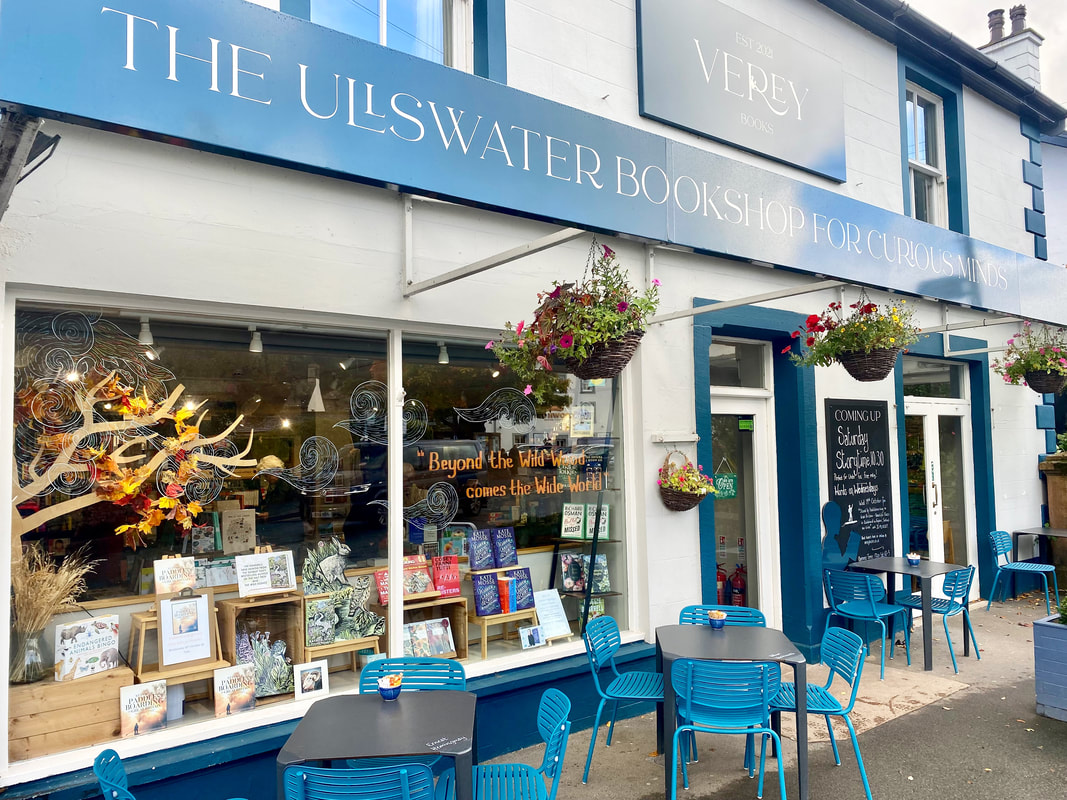To help celebrate this year’s Bookshop Day we caught up with Al of Verey Books, one of the north west’s newest independent bookshops, to put them in the hot-seat and tell us about their little corner of the Lake District.
Let's start by talking a little about the shop itself.
Does your bookshop have any speciality or something that makes it stand out?
General bookstore with Lake District emphasis
Give us an idea of the size of your bookshop. How many books do you currently have in stock?
4631
How large a team do you have?
10: 2 full-time; 8 part-time
Ok. Now let's talk a little about you.
What is your role within your bookshop?
Director; bookseller; stockist
Tell me a little about your background and how you got into bookselling.
I had been teaching English at secondary schools and a prep school for 10 years, until 2021. I had always wanted to work or own a bookshop. In Feb 2021 I did the online introductory course to bookselling with Patrick Neale. In mid 2021 a property became available, the finance fell into place, and we opened in Feb 2022.
What kind of books do you like to read?
Literary fiction; poetry; historical non-fiction
What are your favourite go-to staff recommendations?
Claire Keegan; Cormac McCarthy; Ursula le Guin; Wendell Berry
How has business been this summer?
Very busy, our busiest moment in the year is the summer when the tourists come to the Lake District
Please tell us about one or two of your most recent events.
Helen Rebanks - The Farmer's Wife; Chris Butterfield - Wainwright Memories. Both local authors whose books have clear local relevance. These events seem to do best for us.
What are your customers coming in and asking for?
Helen Rebanks; Rory Stewart; James Rebanks; M. W. Craven; Wainwright/walking guides; local maps.
And finally, can you give us an idea of what’s selling where you are. What are your current bestsellers?
Politics on the Edge (Rory Stewart); The Farmer's Wife (Helen Rebanks); The Last Devil To Die (Osman); The Salt Path (Raynor Winn); The Lake District Sticker Book; Yoga for Stiff Birds.
For some of these RECOMMENDATIONS and many more head to verey books or pay them a visit this weekend to show them some support this Bookshop Day!
Let's start by talking a little about the shop itself.
Does your bookshop have any speciality or something that makes it stand out?
General bookstore with Lake District emphasis
Give us an idea of the size of your bookshop. How many books do you currently have in stock?
4631
How large a team do you have?
10: 2 full-time; 8 part-time
Ok. Now let's talk a little about you.
What is your role within your bookshop?
Director; bookseller; stockist
Tell me a little about your background and how you got into bookselling.
I had been teaching English at secondary schools and a prep school for 10 years, until 2021. I had always wanted to work or own a bookshop. In Feb 2021 I did the online introductory course to bookselling with Patrick Neale. In mid 2021 a property became available, the finance fell into place, and we opened in Feb 2022.
What kind of books do you like to read?
Literary fiction; poetry; historical non-fiction
What are your favourite go-to staff recommendations?
Claire Keegan; Cormac McCarthy; Ursula le Guin; Wendell Berry
How has business been this summer?
Very busy, our busiest moment in the year is the summer when the tourists come to the Lake District
Please tell us about one or two of your most recent events.
Helen Rebanks - The Farmer's Wife; Chris Butterfield - Wainwright Memories. Both local authors whose books have clear local relevance. These events seem to do best for us.
What are your customers coming in and asking for?
Helen Rebanks; Rory Stewart; James Rebanks; M. W. Craven; Wainwright/walking guides; local maps.
And finally, can you give us an idea of what’s selling where you are. What are your current bestsellers?
Politics on the Edge (Rory Stewart); The Farmer's Wife (Helen Rebanks); The Last Devil To Die (Osman); The Salt Path (Raynor Winn); The Lake District Sticker Book; Yoga for Stiff Birds.
For some of these RECOMMENDATIONS and many more head to verey books or pay them a visit this weekend to show them some support this Bookshop Day!

